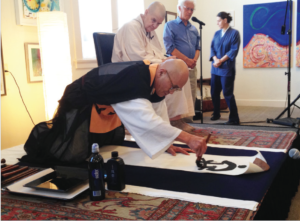by Steve Heilig, New School Host
Each time we present a New School talk related to death and dying, I am mildly and pleasantly amazed that people actually show up. What are all these people—old, young, in-between—doing here? Thinking and talking about our mortality is not something most humans easily do. It may even be against our nature, and we tend to live in denial until forced to confront it. But that seems to be changing. And that’s a good thing.
I’ve spent decades wrestling professionally, personally, and sometimes publicly, with issues surrounding death. At some of the earlier gatherings about death and dying I was involved with, people lamented low turnout, wondering why more didn’t come to hear excellent presentations and warm camaraderie. I reminded attendees that we were at least to some degree “freaks” for even being willing to talk about this stuff. After all, when colleagues and I developed guidelines for “assisted dying” in a medical journal 20 years ago, the New York Times called our work “guidelines for the unthinkable.”
But most wise teachers and spiritual traditions counsel us to think about it. When we began The New School more than a decade ago, we decided to host conversations on this difficult subject. They were popular from the start, so we’ve kept going. Thus, you can look on our New School website’s library, hit the “dying” category, and find more than 20 talks by such luminaries as Frank Ostaseski, Rachel Remen, BJ Miller, Lael Duncan, Sunita Puri, Shodo Harada Roshi, Mark Renneker, Nate Hinerman, and even Ram Dass— physicians, philosophers, ethicists— you name it. And we will have more.

for a series of conversations about death and dying
in 2008, 2014, and 2015.
During my career, I have seen, for whatever combination of reasons, that death is becoming much more talked about, as if a taboo is dissolving. Sections of bookstores that used to contain only a couple of titles on dying now burst with books. Medical schools are including more training on care of the dying. Advance directives proliferate, allowing patients to specify how they wish to be treated. Progress in the legalization of alternative methods for pain management—and even psychedelic substances—can be at least partly traced to use and potentials in patients facing mortality. The still relatively new specialty of palliative care is one of the most heartening developments in the field. Hospice care is increasingly seen as a crucial resource. New professions, such as “death doulas,” have arisen. People talk openly about how they want their bodies to be treated after death.
In 2019, new concerns around death arise. A looming ecological meltdown forces ever more people to consider that we face growing risk of annihilation. Our healthcare system still stinks in too many ways. Baby boomers, “influencers” that they are, are facing their own demise, and younger people, too, are looking into this final fact of life. For most of us personally, death is still scary, sad, and mysterious, and will remain so to at least some degree. What we do know is that becoming familiar with dying while we are alive can make it less frightening when we actually face it.
Maybe this aspect of impermanence is becoming a bit less isolated, hidden, denied, and feared. Which means that more and more of us are becoming, at least in this respect, freaks. And that is an utterly worthwhile, amazing, valuable goal and gift.
Find all of our podcasts and videos on the topic of death and dying at tns.commonweal.org/tag/dying/.